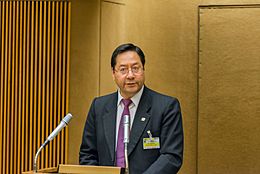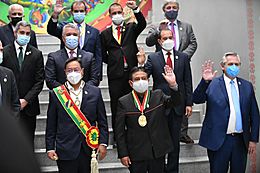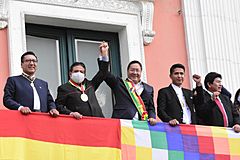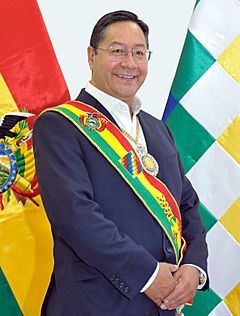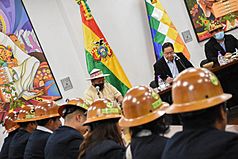Luis Arce facts for kids
Quick facts for kids
The Most Excellent
Luis Arce
|
|
|---|---|
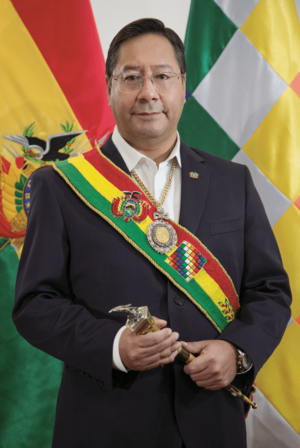
Official portrait, 2020
|
|
| 67th President of Bolivia | |
| Assumed office 8 November 2020 |
|
| Vice President | David Choquehuanca |
| Preceded by | Jeanine Áñez |
| Minister of Economy and Public Finance | |
| In office 23 January 2019 – 10 November 2019 |
|
| President | Evo Morales |
| Preceded by | Mario Guillén |
| Succeeded by | José Luis Parada |
| In office 8 February 2009 – 24 June 2017 |
|
| President | Evo Morales |
| Preceded by | Himself (as Minister of Finance) |
| Succeeded by | Mario Guillén |
| Minister of Finance | |
| In office 23 January 2006 – 8 February 2009 |
|
| President | Evo Morales |
| Preceded by | Waldo Gutiérrez Iriarte |
| Succeeded by | Himself (as Minister of Economy and Public Finance) |
| Personal details | |
| Born |
Luis Alberto Arce Catacora
28 September 1963 La Paz, Bolivia |
| Political party | Movement for Socialism (not recognised by a faction) |
| Other political affiliations |
Socialist Party-1 |
| Spouses |
Jéssica Mosqueira
(divorced)
|
| Children | 3 |
| Parents | Carlos Arce Olga Catacora |
| Education | Mexico School Institute of Banking Education |
| Alma mater | Higher University of San Andrés (BEc) University of Warwick (MEconSc) |
| Occupation |
|
| Signature |  |
Luis Alberto Arce Catacora ( born 28 September 1963), often referred to as Lucho, is a Bolivian banker, economist, and politician serving as the 67th president of Bolivia since 2020. A member of the Movement for Socialism, he previously served as minister of finance—later minister of economy and public finance—from 2006 to 2017, and in 2019.
Contents
Early life and career
Luis Alberto Arce Catacora was born on 28 September 1963 in La Paz. He is the son of Carlos Arce Gonzales and Olga Catacora, both teachers. Arce grew up in a middle-class family, beginning his school studies in 1968 and graduating from high school in La Paz in 1980. He studied at the Institute of Banking Education in La Paz, initially graduating as an accountant in 1984. In 1991, he received a bachelor's degree in economics from the Higher University of San Andrés before completing his studies abroad at the University of Warwick at Coventry, United Kingdom, where he graduated in 1997 with a master's in economics. He also holds an honorary doctorate from the University of los Andes (UNANDES) and the Franz Tamayo Private University (UNIFRANZ) in Bolivia.
Arce spent most of his working life as a public official, beginning in 1987 at the Central Bank of Bolivia, where he spent much of his professional career. From 1992 to 2005, he worked in the International Operations Management of the Central Bank of Bolivia as Deputy Manager of Reserves. Between 1994 and 1995, he was promoted to head of the Department of Information and Publications, of the Research and Analysis Sub-management, under the Management of Economic Studies of the Central Bank of Bolivia.
Arce also started working in academia as an undergraduate and postgraduate professor at various Bolivian public and private universities. He has given lectures at universities in Europe, North America, and South America, including Columbia University in New York, the University of Buenos Aires, and Harvard University.
Minister of Economy
On 23 January 2006, President Evo Morales appointed Arce minister of finance. Three years later, he assumed command of the new Ministry of Economy and Public Finance. Some Bolivian media called Arce the mastermind of Bolivia's economic resurgence. He oversaw Bolivia's nationalization of hydrocarbon, telecommunications, and mining companies, as well as the creation of BancoSur. He oversaw the rapid expansion of the Bolivian economy, with GDP increasing by 344% and extreme poverty reduced from 38% to 15%.
In 2011, the American Economy Magazine ranked Arce the region's 8th-best minister of the economy out of 18. Crowded International Organization has highlighted Arce's work driving the Bolivian economy. Ahead of the 2014 Bolivian general election, The Wall Street Journal considered him the calling card in Morales's reelection.
As the minister of economy, Arce maintained a relatively low profile. Christopher Sabatini, a senior researcher fellow for Latin America at Chatham House and founder of Americas Quarterly, called Arce "one of the few technocrats in MAS". "He's level headed" and "doesn't engage in inflammatory rhetoric", Sabatini wrote. Bolivian media often credited Arce with steering the nation through a period of economic growth. His policies were salient in slashing Bolivia's poverty rate during his terms and facilitating large amounts of economic growth as a result of rising gas exports.
On 24 June 2017, Arce was forced to give up his position and travel to Brazil to undergo surgery to treat severe kidney cancer. He remained there for a mandated recovery period before returning to his post as minister of economy on 23 January 2019.
Reappointment
In late 2019, Bolivia was engulfed by a series of increasingly fierce demonstrations, marches, and protests stemming from allegations of electoral fraud in that year's presidential election. During this period of political instability, Arce was forced to announce the government's suspension of various social benefits in some regions, including retiree pensions and school vouchers, due to the ongoing strikes and blockades and the seizure of national tax and customs offices. He estimated that the economic damage of the crisis after fourteen days of strikes was costing the government US$12 million per day, totaling US$167 million by 6 November. Four days later, on 10 November, Arce delivered his irrevocable resignation to the president, justifying that the "irresponsible work of the Plurinational Electoral Organ" made it necessary for him to step down in order to "pacify the country". Morales himself announced his decision to resign a few hours later.
Soon after resigning, Arce took refuge in the Mexican Embassy in La Paz, where he was granted asylum by the Mexican government. Given his medical history, the interim government of Jeanine Áñez granted him and his wife safe-conduct to leave the country. On 6 December, after a brief layover in Lima, Arce arrived in Mexico, where he joined other exiled authorities, including Morales.
Presidency (2020–present)
Nominated by Evo Morales as the Movement for Socialism's presidential candidate in the 2020 Bolivian general election, Arce won the election, getting fifty-five percent of the popular vote.
Arce was sworn in as the sixty-seventh president of Bolivia at the front of the Plurinational Legislative Assembly. In his inaugural address, he outlined his intent to "defeat" the pandemic and pledged to turn around the nation's faltering economy which he blamed the interim government for having "shattered". At the same time, he promised to "govern with inclusion ... , hoping to be remembered as the government that restored hope and social justice".
Domestic policy
COVID-19 pandemic
On 30 December 2020, Arce and the Russian Direct Investment Fund reached an agreement to supply Bolivia with 5.2 million doses of the Russian Sputnik V vaccine, enough to immunize 2.6 million people with two doses. The government granted emergency approval for the vaccine on 6 January 2021, with the first shipments arriving later that month. Immunization for individuals over fifty years of age began on 13 May. Arce, then-fifty-seven, initially stated that he "intended to be the last to be vaccinated". However, he ultimately chose to receive his first dose of the Sputnik V vaccine at a hospital in El Alto on 24 May as a "signal for the population". Arce was given his second dose at the La Paz Health School on 22 October, where he reiterated his call for Bolivians to get vaccinated.
To promote an increase in vaccinations, Arce issued a Supreme Decree N° 4641 on 22 December mandating that individuals provide proof of vaccination or a negative PCR test to access most public institutions, including banks and airports, as of New Year's Day 2022. In its first week, the mandate achieved its intended effect of boosting vaccinations, with daily inoculation figures rising from 2,000 per day to around 100,000. However, protests from traditionally government-aligned unions led the administration to back down on the policy.
Culture
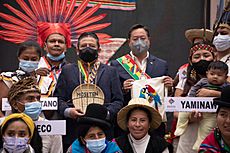
As president, Arce reincorporated the Wiphala —flag of the indigenous peoples of the Andes—into the presidential sash. Áñez had removed the flag from the garment, though she maintained it as an official symbol of the State in all government acts, as mandated by the Constitution. On the other hand, Arce faced criticism for retiring the flag of the Patujú flower—emblem of the eastern indigenous peoples—as a co-official flag, alongside the Wiphala and national tricolor, from official acts of government, as his predecessor had done. Only the Patujú flower—not the flag—is prescribed as a patriotic symbol of the State by the Constitution.
Upon inaugurating his new cabinet on 9 November 2020, Arce pledged to re-establish the Ministry of Cultures. The office was established in 2009 during the Morales administration, but the Áñez administration had abolished it in June to reduce government expenditure. The reconstituted ministry—dubbed the Ministry of Cultures, Decolonization, and Depatriarchalization—was created through Supreme Decree N° 4393 on 13 November, and Sabina Orellana was appointed to head it on 20 November.
On 13 January 2021, Arce instituted the Chakana cross as the government's official logo, replacing the previous logo promulgated by Áñez after just a year in use. The cross displays twenty-four fabrics, symbols, and textures, representing a variety of textile designs from the various regions of Bolivia. Arce assured that representing "the identity of each Bolivian is the most important thing so that the country moves forward, integrated, united, and inclusive".
Economy
To mitigate the effects of the pandemic and reactivate domestic markets, Arce enacted a "Bonus against Hunger" totaling Bs1,000, benefiting some four million unemployed Bolivians above eighteen and below sixty years of age. The program was funded through a credit from the World Bank, amounting to US$54 million, and the Inter-American Development Bank, amounting to US$450 million, for a total of US$504 million. The distribution period for these payments began on 1 December and expired on 1 March 2021. On 16 April, the deadline was extended to 31 May due to the inability of some beneficiaries to receive their bonus. During the first payment stage between December and March, 4,015,364 people benefitted from the payments. A further 20,409 individuals received their bonus between April and May, totaling 4,035,773 beneficiaries nationwide. The Ministry of Economy reported that a total of Bs4,305 million were allocated to the population during the course of the program.
On 28 December 2020, Arce enacted Law N° 1357 Tax on Large Fortunes, a permanent yearly wealth tax on those with a personal wealth above US$4.3 million. The law established the gradual increase in tax collection, with a 1.4 percent levy on those with a personal wealth ranging between US$4.3 million and US$5.7 million; 1.9 percent from US$5.7 million to US$7.2 million; and 2.4 percent on fortunes larger than that. The measure applied to all assets stored in accounts at home or abroad by any persons residing in Bolivia—including foreigners—for more than 183 days. The fine for failing to comply with this measure was equivalent to 200 percent of the initial amount due. The Ministry of Economy initially estimated that the new legislation would allow the government to collect Bs100 million (US$14.3 million) in taxes from 152 registered individuals. By 2021, it was announced an amount of approximately Bs240.1 million from 206 registered individuals had been collected, an overperformance of 240.1 percent from the initial goal. Of the amount collected, Bs237.2 million came from citizens residing in the country—206 taxpayers—while Bs2.9 million came from those living abroad—six taxpayers.
On 18 February 2021, Arce announced that he had ordered the Central Bank to return an International Monetary Fund (IMF) loan totaling US$327 million previously granted to the Áñez government as aid for the economic crisis. Aside from the base price of paying back the loan, the move additionally cost the country another US$24 million in interest and commissions.
Nearing the end of 2021, Arce's economic policies had achieved a 9.4 percent increase in the country's GDP, reversing the previous year's historic decrease of 8.8 percent. In a speech commemorating Plurinational State Day on 22 January 2022, Arce lauded his economic achievements, pointing out that Bolivia was the third fastest-growing economy in the region and highlighting that the country suffered the lowest inflation rate in South America at just 0.9 percent. Other positive aspects he pinpointed were that Bolivia had registered a trade surplus for the first time in seven years and the twenty percent reduction in the wealth gap, the lowest such gap in the country's history.
Throughout April 2022, Arce conducted yearly negotiations with the Bolivian Workers' Center (COB) regarding an increase in workers' wages. The COB proposed a ten percent raise in the minimum wage and a seven percent increase in the contract salary, while the government countered with a 1.5 percent increase in both. After a period of negotiations, Arce announced that he and the COB had agreed to raise the minimum wage by four percent from around US$311 to US$327. Meanwhile, workers in the health and education sectors received a three percent salary increase. Vice Minister of Budget Zenón Mamani noted that other public and private sector workers could also negotiate their salaries with their employers "on the basis of three percent". Arce officially codified the wage increase into law on 1 May as part of a ceremony celebrating Labor Day in Oruro. At the event, the president also signed three other decrees into law, including granting workers the right to paid leave in the case of a death in the family, marriage, or birthday.
Security
At the behest of the United Nations, the Arce administration assumed international commitments to combat terrorism and its financing. On 2 July 2021, Arce delivered a draft bill against the legitimation of illicit profits, financing of terrorism, and the proliferation of weapons of mass destruction.
The proposed law faced backlash from the opposition, who considered it "draconian" due to the alleged extraordinary powers given to government agencies to conduct investigations into individuals, empowering political persecution. Discontent with the legislation led Arce to face his first major protests during his presidency. On 11 October, trade unions, civic committees, and other groups demanding the law's repeal instituted blockades on transit routes in the cities of Cochabamba, La Paz, and Santa Cruz. Arce accused the opposition of promoting a coup d'état. By 14 October, over 300,000 people had participated in mass nationwide demonstrations and strikes led by social and union organizations. Such widespread opposition forced Arce to withdraw the bill from the Senate to "not give rise to violence". Minister Lima pledged that the initiative would not be reintroduced for the remainder of Arce's term, expiring in 2025.
Foreign policy
Arce's foreign policy was primarily characterized by its realignment of the country back to the traditional status quo prior to the removal of Morales. In his first diplomatic act as president, Arce restored relations with Iran and recognized the administration of Nicolás Maduro as the legitimate government of Venezuela, discarding Juan Guaidó, whom Áñez had previously recognized. In a ceremony at the Plaza Murillo on 11 November 2020, ambassadors Mortessa Tabreshi of Iran and Alexander Yánez of Venezuela presented their diplomatic credentials to the president. On 20 November, the Foreign Ministry reported that Arce had directed it to resume Bolivia's membership in the Bolivarian Alliance for the Peoples of Our America (ALBA), the Community of Latin American and Caribbean States (CELAC), and the Union of South American Nations (UNASUR). In particular, Arce described CELAC as the "best way" to integrate the Latin American region and called for the recovery of UNASUR as a continent-wide institution.
2024 Coup d’état attempt
On 26 June 2024, following irregular troop movements in La Paz, soldiers stormed the Bolivian Presidential Palace as part of an apparent coup attempt against Arce. This occurred the day after Juan José Zúñiga, commanding general of the Bolivian Army, was dismissed from duty by Arce.
Personal life
Arce was married to Jéssica Mosqueira with whom he had three children; Luis Marcelo, Rafael Ernesto, and Camila Daniela. His current wife is Lourdes Brigida Durán Romero. She is the first First Lady of Bolivia to be the wife of the president since 2006. Evo Morales was never married, with his sister Esther Morales serving as First Lady, while Jeanine Áñez's husband Héctor Hernando Hincapié Carvajal served as the First Gentleman. Arce is fluent in English as well as Portuguese.
Electoral history
| Year | Office | Party | Votes | Result | Ref. | |||
|---|---|---|---|---|---|---|---|---|
| Total | % | P. | ||||||
| 2020 | President | Movement for Socialism | 3,393,978 | 55.10% | 1st | Won | ||
| Source: Plurinational Electoral Organ | Electoral Atlas | ||||||||
Images for kids
See also
 In Spanish: Luis Arce para niños
In Spanish: Luis Arce para niños


